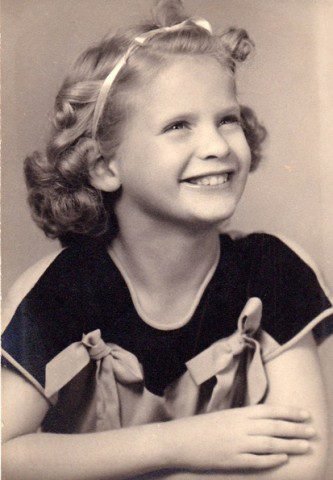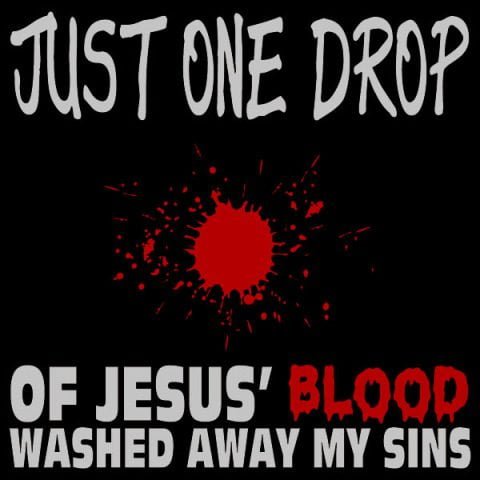
My mom was born in 1938 to John and Jeanette Tieken. John owned a farm in Missouri. He was also a pilot and an airplane mechanic. I don’t know much about my mom’s childhood, but three stories come to mind. (Please see John.)
Mom had a younger brother, Steve. Their dog had puppies that John didn’t want. Instead of giving them away, John forced his son to put them in a burlap bag, take them down to the creek, and drown them.
Mom told me towards the end of her life that John had repeatedly sexually molested her. (Look at the picture of my mom above. This is the little girl John molested.) When Mom confronted him about his crimes, John, now a Fundamentalist Baptist Christian, pleaded the blood of Christ over his SBC — sins before Christ. As you shall read later in this post, John did a lot of sinning post-Jesus too. John told my mom that “God had forgiven him and so should she!” No apology, no attempt to make amends. Just cheap, meaningless Christian cliches. This would be John’s approach throughout my life with him. Not one time did I ever hear him say he was sorry or wrong.
John was a violent drunk during my mom’s childhood. His wife Jeanette was an alcoholic too. (Grandma would later quit drinking cold turkey. I had a close relationship with her.) Their alcoholism created such dysfunction for my mom and her brother that a Missouri court took them out of their home and placed them with their grandparents.
John and Grandma divorced. John then married a woman named Margaret. They too would divorce. Mom had a close relationship with Margaret, corresponding with her for years. I remember reading several of her letters. John left Missouri in the 1950s/1960s and moved to Pontiac, Michigan (Waterford Township). He married a Fundamentalist Christian divorcee named Ann. She had a son named David who was a few years older than I.
Sometime in the 1960s, the alcoholic John Tieken was gloriously saved by Jesus at Sunnyvale Chapel — an Independent Fundamentalist Baptist (IFB) congregation without the label. (Sunnyvale is now defunct.) My first memories of my grandparents come from this period of time. As I pondered what to write for this post, it dawned on me that I only have two good memories of my grandparents. That’s it. Try as I might, I can’t recollect any other good experiences with them. There are reasons for this as you shall see in a moment.
John may have been saved and alcohol-free, but he was still a violent man — at least to some family members. My siblings and I would stay with the Tiekens during the summer. One day, David, who was an avid high school baseball player and fisherman, was sitting at the dinner table with the rest of us. John said something to David and he smartly replied. John stood up from the table, and with a balled fist he struck David in the face, knocking him off his chair. I would also face his wrath one summer day. My younger brother and I were playing in the garage. We found an old Bell telephone, which I proceeded to take apart, doing what boys do. When John found out, he beat the living shit out of me; the worst beating I ever received besides the one my Dad’s farmer brother gave me for moving his beer. There would be many violent outbursts from John over the years, reminding me that Fundamentalism and violent temperaments don’t go well together.
One deep, dark secret in my life comes from my childhood with the Tiekens. As I mentioned previously, my siblings and I would spend time in the summer with them, both by ourselves and with our mom. Ann would have my brother and I get in the bathtub to take a bath. While bathing, Ann would come in and show us how to “clean our genitals.” She “taught” us this lesson several times. It would take years for me to realize that she was sexually molesting us.
I did say that I had two good memories of John and Ann, so I will share them now. John, a pilot, and mechanic, was the co-owner of T&W (Tieken and Wyman) Engine Service at Pontiac (Michigan) Airport. My first fond memory of John was when he took me up in a twin-prop cargo plane he had just overhauled. Boy, was that fun (and terrifying).

My other fond memory dates back to the summer of 1968, the year the Detroit Tigers won the world series. For my eleventh birthday, John took me to watch the Tigers play the Cleveland Indians. I remember John buying me a pennant. On this day, I felt close to my grandfather. Just a grandfather and his oldest grandson enjoying their favorite sport. Alas, this would be the first and last time we did anything together.
John and Ann were devout Fundamentalist Baptists. They attended church every time the doors were open. John became an in-your-face soulwinner — a bully for Jesus. No matter where he went, he felt it his duty to witness to people, often embarrassing family and friends. He was also a big proponent of loud prayers before meals at restaurants, letting everyone around us know that we were born-again Christians.
I enrolled for classes at Midwestern Baptist College in the fall of 1976, as did my future wife, Polly Shope. Midwestern was located in Pontiac, Michigan so this put me in contact with John and Ann. Polly quickly learned, as I had long known, that the Tiekens were domineering and controlling. By the time we started our junior year of college, we had distanced ourselves from them.
I saw John and Ann maybe once a year — Christmas at my mom’s home — from 1979 to 1986. By then, I was pastoring Somerset Baptist Church in Mt. Perry, Ohio — a fast-growing IFB congregation that eventually reached a high attendance of 206.
John and Ann came to visit the church twice in the eleven years I was there. One Sunday, John thoroughly embarrassed me in front of the entire congregation. The building was packed. This was during the time when the church was growing rapidly. After I preached and gave an invitation, I asked if anyone had something to share. John did. He stood and told the entire congregation what was wrong with my sermon. I wanted to die (and murder him).
The last time John and Ann came to visit was in 1988. We were living in Junction City at the time. After church, we invited them over for dinner. John spent a good bit of time lecturing me about my car being dirty — the beater we used to deliver newspapers. According to John, having a dirty car was a bad testimony.
After dinner — oh, I remember it as if it were yesterday! — we were sitting in the living room and one of our young boys got too close to John. What did he do? He kicked him. I knew then and there that, regardless of his love for Jesus, he didn’t love our family, and he would always be a mean son-of-a-bitch.
From this time forward, we had little to no contact with the Tiekens. Sometime in the late 1990s — I was pastoring Our Father’s House in West Unity, Ohio, at the time — Ann called me a few days before John’s seventy-fifth birthday and said she was having a party for him and expected our family to be there. When I explained that we couldn’t attend (it was on a church night and Polly had to work), Ann launched into a vitriolic tirade, telling me what a terrible grandson I was. Vicious and vindictive as always, Ann told me I had a terrible family.
Finally, after forty years, I had had enough. I told her that should have worried about the importance of family twenty years ago. I then told her that I was no longer interested in having any contact with them. And with that, I hung up the phone. I had finally learned to cut these toxic people out of my life — almost.
A few years later, I heard through the family grapevine that John was dying from colon cancer. I traveled three hours to Pontiac to visit him. Why? I don’t know. When I entered his hospital room, Ann wasn’t there — a small favor from God, I thought at the time. John was sedated and unable to communicate. I stood there for a few moments, with tears trickling down my face (as they are now). And then I walked away. He died a short time later. I did not attend his funeral. I knew it would be a masturbatory celebration of John, the Fundamentalist Baptist soulwinner. I had no appetite for yet another lie.
I never expected to see Ann again. When I said I wanted nothing to do with John and Ann, I meant it. They had caused so much pain in my life. I had no interest in my children knowing anything about them (and they don’t). In 2003, I began pastoring Victory Baptist Church in Clare, Michigan — a Southern Baptist congregation. Unbeknownst to me, Ann had remarried and moved to Clare. She lived five minutes from our home in White Birch — a gated community outside of Farwell. What are the odds, right? Was God punishing me?
Ann attended a nearby Southern Baptist church. One Sunday, I looked out the church door while I was preaching and saw Ann sitting in the parking lot with her husband and David’s son. (David was murdered in Detriot in 1981, at the age of twenty-six.) After the service, I briefly talked to her. The next Sunday, Ann visited Victory Baptist, and after the service invited us over to dinner later in the week. I didn’t want to go, but I thought, what kind of Christian am I? Surely, I can forgive her and let the past be the past.
And so we went. Things went fairly well until Ann decided to let me know — as if it was a fact that everyone knew — that my dad was not really my father. I showed no reaction to this revelation, but it stunned me and cut me right to the quick. I knew my Mom was eighteen and pregnant when she married Dad, but I had never before heard what Ann was telling me. Why did she tell me this? What good could ever come of it? Two years ago, I took a DNA test, confirming that my father was actually a truck driver from Chicago. So Ann was right. But the fact remains that this was not hers to tell; that she did so to hurt me. I never saw Ann again. Last I heard, her husband died and she was in a nursing home.
Members at Victory Baptist were excited to find out that I was the oldest grandson of Gramma Clarke (her new married name) — a fine, kind, loving Christian woman if there ever was one, they told me. All I ever told them is that things are not always as they seem.
Years later, Ann did a Facebook search on my name and “found” me. She sent me a message that said:
What ? An athiest ?? Sorry Sorry Sorry !!!What happened ? How’s Polly & your family??
Nine years, and this is what she sent me. I sat down and wrote her a letter. You can read it here.
I wrote:
I don’t wish you any ill will. That said, I don’t want to have a relationship with you, especially a pretend Facebook friendship. Ooh Look! Bruce got reconnected with his estranged Grandmother. Isn’t God good!!
Not gonna happen. I have exactly zero interest in pursuing a relationship with you. It is too late.
My “good” memories of you and Grandpa are few and far between (and I haven’t even mentioned things that I am still, to this day, too embarrassed to mention). You really don’t know me and I don’t know you. And that’s okay.
Life is messy, Ann, and this is one mess in aisle three that no one can clean up. I have been told that I have a hard time forgiving and forgetting. This is perhaps a true assessment of me. I told Polly tonight that I am quite willing to forgive but it is hard to do when there is never an admission of guilt or the words I am sorry are never uttered. How can there be since the blood of Jesus wipes away every shitty thing a person has ever done? Talk about a get out of responsibility for sin card.
I am sure you will think I am just like my mother. I am.
You know what my last memory of my Mom is? After I tearfully and with a broken heart concluded my 54-year-old Mom’s graveside service, Grandpa Tieken took the “opportunity” to preach at us and tell us that Mom was in Heaven. Just days before she had put a gun to her chest and pulled the trigger. We all were reeling with grief and pain and Grandpa, in a classic Grandma-and-Grandpa-Tieken moment, decided to preach instead of love.
A comment by Amy B actually provoked me — in a good way — to write this post tonight:
I’m astonished (and impressed) that you feel no bitterness towards your grandfather. I hate his guts, and I never met the man!
I certainly have plenty of reasons to be bitter towards John and Ann (I refuse to call them Grandpa and Grandma). Not wanting to write a tome, this post is just a summary of the heartache and harm caused by John and Ann. I am sure some Christians might think that my unwillingness to forgive them is a sign of bitterness. That’s the problem with Christianity and its demands that we forgive people no matter what they do to us, Fake, syrupy “love” demands they “forgive” regardless of the pain and trauma caused by others.
I reject this kind of thinking. I don’t owe anyone forgiveness, though I have asked for forgiveness and forgiven others countless times. In the name of God and in accordance with the teachings of the Bible, John and Ann showed nothing but contempt for me, my mother, and my younger siblings. We never measured up. They used money and gifts to manipulate us, demanding that we conform to their exacting Biblical standard. Imagine my surprise years later when I learned that Ann was a Valium addict. Even she couldn’t measure up.
John and Ann were big fans of Bill Gothard and his Institute in Basic Life Principles seminars. Year after year, John would badger me about attending the Detroit seminar, saying he would pay for it. I always said no, thinking that I could see no discernable difference IBLP made in their lives, so why should I bother?
I am now sixty-five years old. What am I to make of the terrible wound John and Ann left on my life? Some family members, mainly my uncle Dave’s family and my mom’s younger brother, Steve, view John and Ann differently from the way in which I do. Were their experiences so much different from mine? I don’t know. It seems more likely to me that Evangelical Christianity, with its dysfunctional teachings about love and forgiveness, keeps them from honestly giving an account of their experiences with John and Ann Tieken. The blood of Jesus continues to cover up trauma that caused untold heartache and harm.
I don’t blame them for doing so, but that’s not the approach I take. Instead, I value responsibility, accountability, repentance, and restitution. John and Ann wanted forgiveness without these things, and I am not going to give it to them. That I write about my life with John and Ann Tieken infuriates some people in my extended family. They want me to leave the deep, dark secrets of the past buried in the sea of God’s forgetfulness. How do we learn to do differently if we don’t tell our stories? I want my children to better understand me as a man. What better way to do that than tell my story — painful warts, and all? I want my grandchildren to know me as I am, not as a caricature or a facade. These experiences have made me into the man I am today. When people confide in me, speaking of the trauma they experienced in their lives, I understand. I am a deeply marred and wounded man, but I survived. That’s the key. I SURVIVED! I wish Mom were alive today so we could toast our survival together. Instead, the most important person in my life, save Polly, is dead, having killed herself at age 54. When I think of John and Ann Tieken, I can’t help but lay much of the blame for her suicide at their feet. They could have loved Barbara and her children, but they chose not to (or loved them in a warped Evangelical way). They could have helped by giving of their time and money, as Jesus would have done. Instead, they judged and berated us for not measuring up, withholding material help because we weren’t doing things the right way. Mom’s life was a mess. John and Ann could have lent a hand, loving her as they were commanded to do so in the Bible. Instead, they micro-judged every part of her life, raining judgment on her head, and when I got older they did the same with me, my wife, and our children. Is it any wonder that I wanted nothing to do with them; that when John died I felt nothing; that when I hear of Ann’s demise, I will likely feel the same? Whatever feelings I might have had for John and Ann Tieken died two decades ago. They are little more than a chapter in my autobiography now — that is except for the ugly marks they left on my life. These deep wounds will never go away. All I know to do is keep telling my story, and when I feel John and Ann closing in, call my therapist and say, let’s talk.
Bruce Gerencser, 68, lives in rural Northwest Ohio with his wife of 47 years. He and his wife have six grown children and sixteen grandchildren. Bruce pastored Evangelical churches for twenty-five years in Ohio, Texas, and Michigan. Bruce left the ministry in 2005, and in 2008 he left Christianity. Bruce is now a humanist and an atheist.
Your comments are welcome and appreciated. All first-time comments are moderated. Please read the commenting rules before commenting.
You can email Bruce via the Contact Form.



